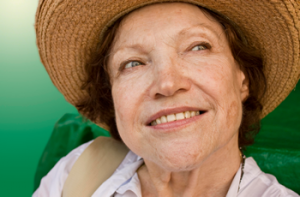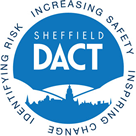Domestic Abuse and Older People
In later life, people can experience physical, sexual, emotional and financial abuse, as well as neglect, from their partners and other family members. But lower reporting rates suggest that it may be harder for older people to seek help and that they may have additional needs. As with any other group, older people are not all the same, and will have very different life experiences, opinions, needs and abilities. Sheffield Adult Safeguarding Service reports that more women than men experience domestic abuse at an older age (although more older men experience neglect).
If you are experiencing abuse in later life
Although all cases of domestic abuse are different, researchers have identified the following patterns in abuse experienced later in life:
Domestic abuse grown old
 If you have experienced years of abuse with your partner, it will be hard to imagine a different life. You may have married at a time when marriage was thought an unbreakable, life-long commitment. Sometimes abuse has gone on unnoticed for years and gets picked up by services because one adult becomes frailer. You might have had tried to tell someone in the past and had an unhelpful response, or you might worry that workers would be unsupportive because you have stayed with your partner for so long.
If you have experienced years of abuse with your partner, it will be hard to imagine a different life. You may have married at a time when marriage was thought an unbreakable, life-long commitment. Sometimes abuse has gone on unnoticed for years and gets picked up by services because one adult becomes frailer. You might have had tried to tell someone in the past and had an unhelpful response, or you might worry that workers would be unsupportive because you have stayed with your partner for so long.
Late onset domestic abuse
Sometimes violence starts many years into the relationship, perhaps triggered by illness (such as Alzheimer’s), disability or life changes such as retirement or bereavement. You might have been happily married but changes in your partner’s health or situation has meant that their behaviour has changed for the worse. If you have had a long, loving relationship, it will be especially hard to understand your partner’s violence and may feel that it is not really them.
Domestic abuse with a new partner
If you have entered into an abusive relationship later in life, you may feel confused and ashamed to admit that it hasn’t worked out. But you are as entitled to help and support as any other person experiencing abuse.
Abuse from carers
Domestic abuse in old age is often confused with elder abuse. Figures from the Sheffield Adult Safeguarding Partnership show that in reported cases during 2008-9, more older people in Sheffield were abused by family (27.4%) than paid carers (26%) with 29% listed as perpetrator unknown. If you are being abused by a carer, it will be difficult to understand that someone who is responsible for your essential care can violate that trust, and you may doubt your own understanding. Ring Sheffield Adults Safeguarding Partnership (details below) for help to talk it through and they will take your safety seriously.
Abuse from adult children
Sometimes adult children abuse their parents, which can be even harder for people to talk about and get help. If your son or daughter is abusing you, domestic abuse workers will believe you and will understand that you have lots of different feelings towards your child. Domestic abuse services in Sheffield have seen cases in the past and workers will not be shocked. Financial abuse is common when adult children are abusive, especially if they are financially dependent on you, and emotional, physical and sexual abuse can also occur. Drug and alcohol use are common risk factors when older family members are abused.
Barriers to getting help
As well as the usual barriers people face when experiencing abuse, older people sometimes find it harder to recognise, talk about or leave abusive relationships.
You may:
- Feel Responsible for your Partner – Maybe you have looked after them for many years and are not sure how they would manage without you. Perhaps they are becoming frailer or increasingly confused as they get older.
- Depend on your Partner Financially – Older women especially, may not have worked outside the home and are much less likely to have their own pension.
- Have Strong Opinions About Marriage – You may believe marriage is for life and feel comfortable with traditional gender roles, where a man has more authority in the relationship and woman has a stronger caring role.
- Have Strong Opinions About Domestic Abuse – You might feel that all marriages have bad patches to work through and accept violence as part of that. Domestic abuse wasn’t considered a crime 30 years ago and attitudes and services have changed significantly in that time.
- Feel Isolated – If your children have grown up and left home or if you don’t have a strong support network. If you have lived with abuse for many years, it will have been hard to develop friendships. If you live in a rural area, it can be harder to keep contact with other people.
- Speak Less English – Older women from ethnic communities, who have had a stronger role in the home, are much less likely to have learned English.
- Have Health Needs – Disabilities or mobility problems can be used against you by an abuser and make it harder to leave abuse. Abusers can dismiss allegations you make as dementia or misunderstanding, and may even succeed in convincing you that you that you are just confused.
- Feel Scared by Change – If you have lived in your home for many years and have a lifetime of possessions and memories to leave behind, the idea of starting from scratch may be terrifying. But there are other options and you can ring the Sheffield Domestic Abuse Partnership Helpline for advice.
If you are reading this on behalf of a parent or older family member
You can ring the domestic abuse helpline or other services to get help and advice on your parent’s behalf. But ideally, it is better if you can support them to make choices and take action themselves. Explain clearly how you understand the situation and what the options are.
Organisations for Support with Domestic Abuse and Elder Abuse
Sheffield Domestic Abuse Co-ordination Team Helpline: 0808 808 2241
Sheffield Adult Safeguarding Partnership: 0114 2734908 / 0114 2736870
Age UK in Sheffield: 0114 250 2850
Sheffield 50+
Older People’s Advisory Group



